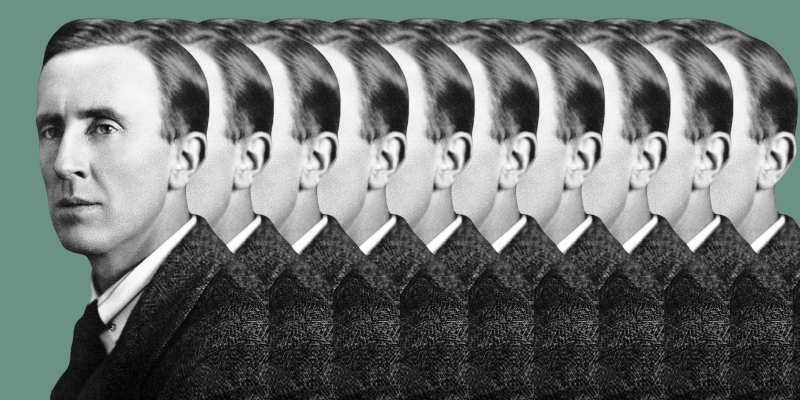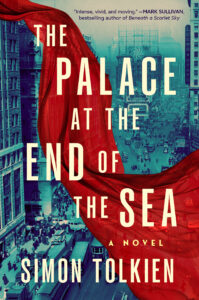
Finding Your Way Into Writing Fiction as J.R.R. Tolkien's Grandson
Simon Tolkien on the Double-Edged Sword of a Mighty Literary Inheritance
My grandfather, J.R.R. Tolkien died in 1973 when I was fourteen. He had been an important figure in my life up to then, and I have strong memories of the time I spent with him in Bournemouth after he and my grandmother retired to live on the south coast. They bought a house but spent most of their time at a hotel on the sea front, the Miramar, where I regularly visited them, traveling down on the train from Oxford. They made me feel loved and special.
My grandfather and I played long and complicated word games and clock golf, and spun pebbles into the waves. I remember that he was very Catholic. In the evening, we said prayers together, and I still have a tiny farthing coin on which he had managed to fit the entirety of the Lord’s Prayer and the Ave Maria in his tiny distinctive handwriting. He played an important role in the decision to send me to the Catholic boarding school, Downside, a year before he died.
I didn’t want to be just J.R.R. Tolkien’s grandson; I wanted to achieve my own destiny; I wanted to create.
When he was gone, the days in Bournemouth seemed like a dream from another life. I was a troubled young man, short on confidence and with a sense of illegitimacy that I couldn’t shake. And my grandfather’s growing fame didn’t help. I felt overshadowed: I didn’t want to be just J.R.R. Tolkien’s grandson; I wanted to achieve my own destiny; I wanted to create. But that was hard because I had convinced myself that I couldn’t write fiction. My grandfather had set the bar too high! And so, I carried on as a lawyer until I passed my fortieth birthday and Peter Jackson made his first Lord of the Rings movie, The Fellowship of the Ring. My grandfather’s popularity reached a new stratospheric level and the creative pressure cooker inside me boiled over, and I began to write my first novel, since when, despite many changes of fortune, I have never looked back.
But all the time I struggled in my self-made prison, I never quarreled in my mind with my grandfather. It was his fame that held me back, not him. And it had no effect on my love for The Lord of the Rings that began when I first read it aged nine, and pestered him with questions about the Blue Wizards and the drowned lands in the west, while he tried to eat his lunch in the Miramar Hotel.
I was enchanted by the unique depth and integrity of the fictional world that my grandfather had created. It was as if he was narrating a history instead of inventing it, so that the book didn’t seem like fantasy at all. Later, I came to understand that this vivid realness is rooted in his genius as a storyteller, which is apparent as early as the first chapters when the small domestic horizons of the Shire open out to a dawning awareness of the immensity of the threat from the great world outside. The homely fire burning merrily on the hearth at Bag End is transformed when Gandalf throws the ring into it, revealing the fiery letters, written in the dread language of the Black Land faraway. And as the wizard tells Frodo its strange history—of Sauron its maker, and proud Isildur who took it for his own, and Gollum who was possessed by it for so long deep under the mountains—Sam Gamgee’s shears fall silent outside the window that Gandalf pulls up suddenly to haul him in. Out of one world and into another. It’s one of my favorite moments in the book.
Scale and its inversion are essential to the book’s structure. The fate of the world depends on a minute object, a ring. It has immense power and yet the purpose of the fellowship is not to use it but to destroy it. And the hobbits have a chance against the might of Sauron because they are too insignificant for the Dark Lord to notice as they pass into his domain, far from aid. Sauron dominates the book which is named after him, and yet he never speaks, making him an inversion of all that one would expect from the villain of the tale. At every turn, the book takes risks and turns literary norms upside down, but succeeds against all the odds. We believe in the power of the ring, we believe in Sauron, we believe that someone as small as a hobbit could save the world. It’s an extraordinary achievement.
So, I became a writer myself, beginning with what I knew from my legal career—crime and courtroom drama, and developing from there into historical fiction. And as I learnt my trade, my characters became more rounded and three-dimensional, driving plot lines instead of being vehicles for their development. There was no school for this; the great novelists were my guide, and none more so than my grandfather. I learnt from him complexity of motivation, a willingness to take risks with storytelling, and the vital importance of landscape. Like Thomas Hardy, my grandfather was able to make his readers see what he wrote, whether it be the beauty of Rivendell or the desolate landscapes of Mordor. His vivid descriptions were an inspiration to me when it came to writing in my new book about the beauty of the Andalusian countryside in the 1930s, or the ravaged battlefields of World War One in my last novel, No Man’s Land. In that book, I tried to bring to life the experience of the British soldiers like my grandfather, who fought on the Western Front, and writing it helped me to understand the profound effect that the war must have had on his imagination: Sauron’s embrace of permanent warfare, and the spiritual and physical desolation of so much of the world east of the River Anduin, are rooted in the horrors of trench warfare. As I wrote in the dedication, I felt that my book honored my grandfather’s memory, and I thought he would have been proud of me. I had traveled a long road to reach a place where I felt his literary legacy was propelling me forward instead of acting as a block to my self-expression.
My grandfather’s literary genius is an inspiration to me, and my own experience as a writer has helped me to understand the highs and lows that he went through himself.
I have tried to build on this relationship in my new duology about the 1930s, The Palace at the End of the Sea and The Room of Lost Steps, concentrating on the theme of courage. Frodo is such a compelling hero in The Lord of the Rings because of his refusal to give up in the face of overwhelming adversity, even when he is utterly broken down and exhausted. In the same way, Theo, my hero, cannot and will not back away from a challenge, whatever the consequences. Nothing can shake his belief that even a small person can change the world, and he is sustained like Frodo by a capacity for intense friendship, an instinctive response to beauty, and an unbreakable determination to do what he thinks is right. Until in the end he is left like Frodo, broken by war, parched with thirst, and alone on a desolate desert plain with his last faithful companion.
Twenty-five years after I became an author, my grandfather’s literary genius is an inspiration to me, and my own experience as a writer has helped me to understand the highs and lows that he went through himself. My books take a long time to research and write, and my new duology expanded to become a portrait of an era set in America, England and Spain, but my effort pales in comparison with the twelve years that it took my grandfather to write The Lord of the Rings, without a contract so that he had no guarantee that it would see the light of day, and while holding down a demanding job. It touches me that large sections of the manuscript are written on the back of examination papers that he was marking to supplement his income, and it moves me to see him in my mind’s eye in his study in North Oxford, writing long into the night, just as I have done so many times. And I know exactly what he meant when he wrote in a letter on the eve of publication that “it will be impossible not to mind what is said. I have exposed my heart to be shot at.”
__________________________________

The Palace at the End of the Sea by Simon Tolkien is available from Lake Union Publishing.
Simon Tolkien
Simon Tolkien is the author of No Man’s Land, Orders from Berlin, The King of Diamonds, The Inheritance, and Final Witness. He studied modern history at Trinity College, Oxford, and went on to become a London barrister specializing in criminal defense. Simon is the grandson of J.R.R. Tolkien and is a director of the Tolkien Estate. In 2022 he was named as series consultant to the Amazon TV series The Rings of Power. He lives with his wife, vintage fashion author Tracy Tolkien, and their two children, Nicholas and Anna, in Southern California.



















